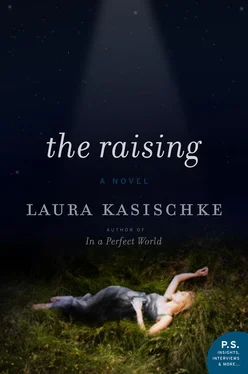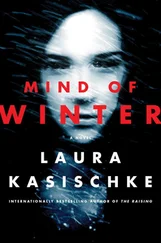A girl in a miniskirt rounded the corner of the hallway, laughing hysterically into her cell phone. She didn’t even glance at him. When Perry rounded the corner himself, he saw that the door to his dorm room was open, and someone was standing in it.
And then he saw who it was.
The bright blond ponytail. The perfect posture.
Nicole Werner.
She turned when Perry came up behind her, and she said, “Hi!” in that voice so bright and girlish it sounded like it was coming out of a piccolo.
“Hi,” Perry said back, sounding like a party pooper in comparison, but who could compete with Nicole Werner when it came to congeniality? He saw Craig, still in his boxer shorts, no shirt, standing a few feet in front of her.
“I came by to see, you know, how it’s going,” she said to Perry, but glanced back at Craig as if trying politely to include him in the conversation. “You know, see if you’d want to set up a study time…”
“Oh. Yeah,” Perry said. He’d forgotten. They’d talked about this back in Bad Axe—after they’d both gotten their acceptance letters, but before she’d been awarded the Ramsey Luke. They’d said they’d keep up the ritual, the weekly study marathons. “Okay,” he said, and shrugged.
Craig caught Perry’s eye then, and Nicole looked from Perry to him. “You’re welcome to join us,” she said to Craig.
Craig nodded, appeared to consider it, and then said, “That would be helpful. I could use the support, you know, to keep up the good study habits.”
Nicole nodded. She’d obviously missed the false note, and the fact that Craig Clements-Rabbitt was half-naked, having been lying in bed with an iPod and Brain Freeze at eight o’clock on a Tuesday night. “Great!” she said. “So, now we just need a time and a place.” She whipped her academic planner out from under her arm in a flash, and slid out a pen conveniently tucked into her ponytail. She stuck the pen in her mouth as she scanned the pages of the planner.
“I’m free anytime,” Craig said.
Perry rolled his eyes.
Maybe her students thought she was deaf. They could chase her down a hallway for half a mile calling out, ��Professor? Professor?”and it did not occur to Mira to turn around.
Professor?
That couldn’t be her.
But here she was, a professor at one of the largest universities in the world. They called her a cultural anthropologist, as if that were an occupation. She was an “Expert on the Treatment of Human Remains in Preliterate Civilizations”—the way her father had been an Insurance Salesman, or her mother, a Homemaker.
She was thirty-three, the mother of two-year-old twins, the wife of a Nice Guy who happened to be content in the role of Stay-at-Home Dad. She’d gotten her Ph.D. with honors and kudos and special awards: a Fulbright to Croatia, and even the unheard-of Guggenheim for a graduate student. Her dissertation, Traditional Burial Practices and Their Folk Origins: Fear, Fantasy, and the Cults of Death , had been published by a major academic press just a few months after she’d finished it. There’d been positive reviews in the specialized journals, and even a quick notice in a newspaper or two because of popular interest in her subject.
So, why, when they called out, “Professor!” did Mira not assume they were calling out to her? Why, day after day in that place, did she feel like such a fraud?
Because, perhaps, she was a fraud?
Mira Polson had ridden into her position as an assistant professor at the Honors College on the merit of that first book, and the “promise” the college saw for her future publications. That was three years ago, and now she was two years away from her tenure review, and there was no doubt—the department chair had made sure she had no doubt— that she would not receive it, and would not be kept on at the university, if she did not publish a book between now and then. And, so far, in the last three years allotted to her by the university to write and publish that book, Mira had produced nothing beyond some scrawled notes on a legal pad—notes that had become, in the year and a half since she’d scrawled them, illegible even to her.
And if she did not get tenure, then what?
Then she would be far worse than a fraud. She would be an unemployed expert on an obscure subject with two toddlers and a husband to support.
This Mira had considered as she closed the apartment door behind her and headed off to Godwin Honors Hall, trying not to listen to the twins scream after her, or to Clark’s impatient shushing on the other side of the door. It took every ounce of fortitude she had to keep walking down the hall toward the stairs.
They had been sick in the night. No fevers, but both had barfed over the sides of their cribs around two o’clock in the morning, Andy taking his cue from Matty, as he usually did when it came to vomiting. They had apparently gorged themselves on Doritos while Mira was at a department meeting the evening before. Clark had been dead asleep when she got home, although it was only nine o’clock.
“The twins sleep, you sleep,” their pediatrician had advised at their two-year checkup when Clark complained that the twins were still waking up once or twice in the middle of the night. Clark had been doing that anyway—sleeping when they slept—as far as Mira could tell, but after the pediatrician’s advice, Clark had made a religion of it. Sometimes he even slept while the twins were awake. Mira would come home to find him out cold on the carpet in the living room beside the playpen while the twins stood inside it, shaking the cushioned edges like bars on a prison door.
They were healthy, active, curly-haired boys who spoke to one another in a rapid chatter that, when she was being irrational, Mira thought might be some linguistic or genetic remnant of her Eastern European forebears in their blood. When they asked for milk, it was milekele ; “bye-bye” was gersko ; “mama” and “papa” were meno and paschk. Sometimes Mira caught herself wishing that her grandmother was still alive to translate. Even more irrationally, she’d gone to the Llewellyn Roper Library in the summer to look up the words for milk , good-bye , mother , father , in Romanian, Lithuanian, Russian, Serbo-Croatian, and cross-referenced them to everything—Latin, French, German, and all the dialects—to find, of course, nothing that indicated that her twins were actually speaking a foreign language.
Of course.
Walking away from the library that day—its stiff neoclassical columns pretending to hold it up—Mira had felt silly, at best. Slightly insane, at worst. So, less insanely, she consulted medical books and websites, but when she asked their pediatrician if the twins might be experiencing some kind of language development delay, he’d laughed and said, “You professors all think your kids should be delivering lectures a few months out of the womb. Look, if they’re still babbling in a foreign language this time next year, we’ll explore the possibilities. But I’m telling you, they won’t be.”
Clark was becoming more and more frustrated these days by the twins’ refusal to speak his language, and Mira knew it was because he was the one at home day after day while she was doing research, going to meetings, teaching. He was exhausted most of the time, wired up with manic energy the rest. There were dark circles the size of half-dollars under his eyes, and in the last three years he’d gone from the horniest man she’d every met—hard inside her again before he’d even pulled out—to the kind of guy women called radio talk shows about: I wonder if my husband’s having an affair; he hasn’t wanted to have sex for the last three months.
Читать дальше












